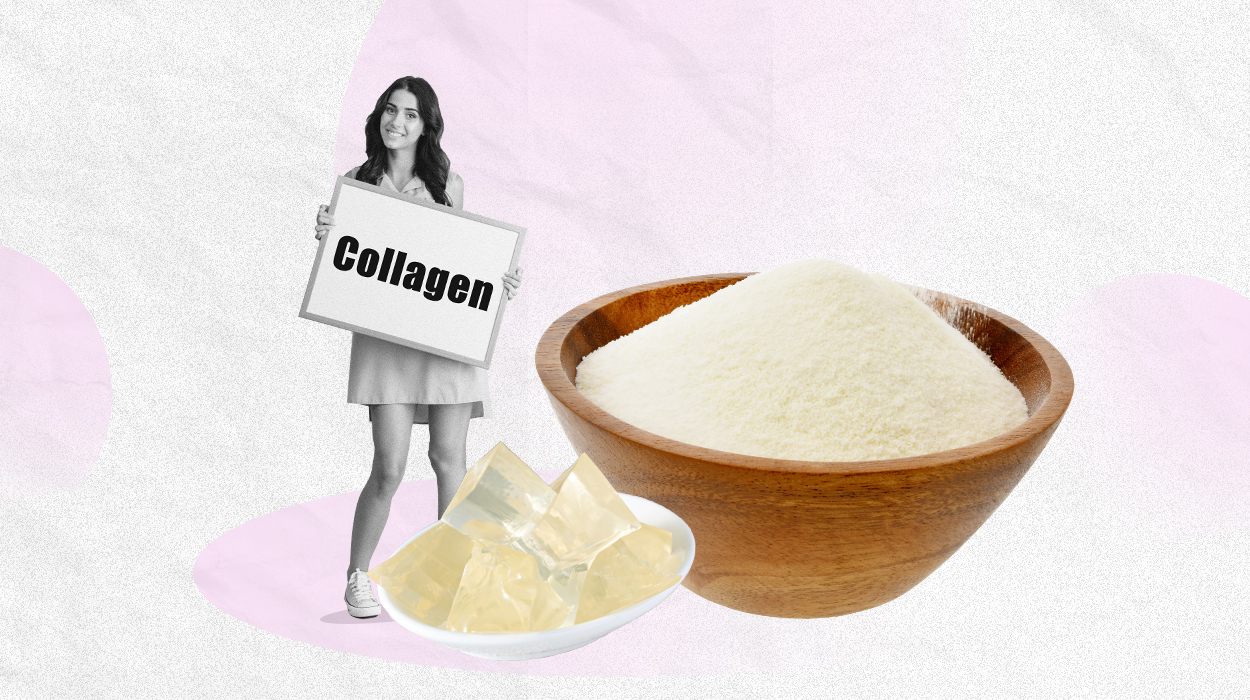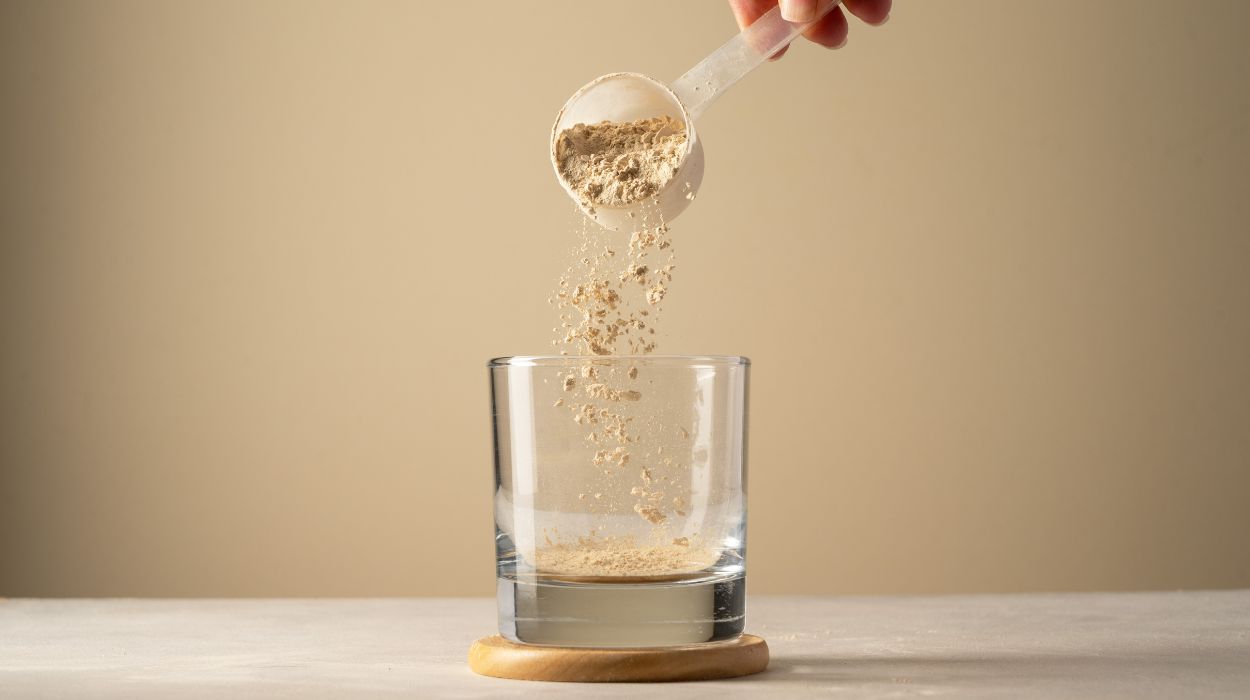 Expert's opinion
Expert's opinion
Expert's opinion
The article is a subjective view on this topic written by writers specializing in medical writing.
It may reflect on a personal journey surrounding struggles with an illness or medical condition, involve product comparisons, diet considerations, or other health-related opinions.
Although the view is entirely that of the writer, it is based on academic experiences and scientific research they have conducted; it is fact-checked by a team of degreed medical experts, and validated by sources attached to the article.
The numbers in parenthesis (1,2,3) will take you to clickable links to related scientific papers.
Can You Take Too Much Collagen? How Much To Take Per Day In 2024?

Collagen is among your body’s keystone and most essential proteins. It is a plentiful protein, with 28 different kinds known to date. The most prevalent kinds in the body are types I, II, III, IV, and V. Each with its designated functions.
Collagen makes up 30% of the dry mass of the body and is made of amino acid chains that play a vital part in the anatomical components and connective tissues of the systems named below.
- Skin
- Tendons
- Muscles
- Ligaments
- Blood vessels
- The digestive system
- Parts of your eyes and teeth
That isn’t all, though. Collagens also aid in the formation of blood clots. This helps a wound heal faster while also protecting the neurological system.
This amino acids chain is obtained from animals’ abundant protein foods such as beef, eggs, dairy, fish, poultry, and bone broth, to name a few. These foods either include collagens that the body absorbs or aid in natural production.
As a result, taking supplements isn’t always necessary because the body can generate them independently. However, this is only achievable if you follow a nutritious diet and live a healthy lifestyle.
Nevertheless, some people still take a collagen supplement that happens to be a non-toxic daily supplement. Which brings us to our question: can you have too much collagen?
Let’s uncover that together, shall we?
Can You Take Too Much Collagen?
Collagen is a substance that the body predominantly and naturally uses for most of its systems. So much so it is generally safe and non-toxic even in supplements, that said, if you are in top shape, you might not have any side effects using collagen supplements appropriately.
On the flip side, some cases reported that these supplements had caused some digestive disturbances. These are like a nasty taste, excessive fullness, and other stomach upset[1] issues.
You are better off getting guidance from a healthcare provider on the appropriate dosages for these reasons. Regardless, if you purchase dietary supplements with a high collagen content, watch how you take them and stick to the recommended dosage.
So yes, you can take too much collagen if you go beyond the recommended dosages. And we will highlight the likely adverse effects you may encounter later on in this piece.
What Happens When You Take Too Much Collagen Per Day?

Is too much collagen bad for you? What happens if you take too much collagen? The effects of taking have both short-term and long-term repercussions. Immediately you exceed the recommended dose; you may start experiencing digestive issues like bloating, heartburn, and stomach upset.
One long-term repercussion is external as it will show on your skin. Your skin can stretch, thicken, and stiffen if you have too much collagen in your system. These are similar effects to an autoimmune disease called scleroderma that triggers the body to produce excess collagen.
Internally, vital organs such as the lungs, heart, and kidneys can potentially be harmed due to this excess. This may be due to oxidative stress.
What Should You Do If You Take Too Much Collagen?
Please stop taking them immediately.
And suppose you are having an allergic reaction or adverse side effect, contact a medical practitioner immediately. If they are mild, avoid using the supplement and contact a healthcare provider. The healthcare provider will determine why the reaction was terrible and help you regain your health.
To avoid all of this, simply stick to the recommended doses. Even if you do not see the results as fast, taking too much won’t speed it up, making you feel worse. So please take what you have been advised.
Types Of Collagen And Recommended Dosages

Hydrolyzed Collagen
Marine from seafood, pigs, cattle (bovine), and chicken is the primary source of hydrolyzed collagen[2] peptides. Because the body quickly assimilates it, this is usually the predominant type of collagen used in many supplements.
Hydrolyzed collagen or collagen hydrolysate is supplied in pill or as collagen powder.
How much collagen per day? Here is some of the scientific evidence of the dosage of hydrolyzed collagens and what each achieves:
- A 2019[3] study found that consuming approximately 2.5-15 grams of collagen per day for bone, skin, and hair health may be beneficial.
- A 2.5-gram collagen daily dose could help with joint discomfort[4] and skin hydration[5].
- Increasing this daily dose of collagen to five grams can be an extra boost to bone mass[6] composition and avoid bone loss[7].
- These hydrolyzed collagen peptides have generally been employed in larger daily doses of 15 grams to enhance body composition[8] and muscle mass.
Undenatured Collagen
This is obtained from poultry cartilage. According to research, ingesting 10-40 mg of undenatured type II collagen per day can enhance joint health[9] dramatically.
Gelatin
Gelatin is a type generated from animal foods and is mostly utilized to prepare gelatinous sweets. As a result, gelatin isn’t widely available as a supplement component. It may be used to raise protein levels in soups, sauces, smoothies, and other dishes.
The right amount of gelatin to take varies on several factors, including the user’s age, health, and other circumstances. However, there is a scarcity of data to back up a particular recommended amount of gelatin to take.
As a result, check the portion size mentioned on the container before using it as a supplement. Before using, be sure to check the package insert and check with your healthcare expert.
The General Recommended Dose Of Collagen Supplements
There is an advised daily amount on the box of most supplements. Daily, consuming 1–2 scoops or tablespoons of the powdered supplement is common. However, taking one or two pills or gummies is also common.
Depending on the product, these servings might vary significantly in content, so verify the nutritional info labeling for exact dosage information.
You also have to note the kind of collagen included in that product so that you can keep the intake within the recommended doses.
Health Benefits Of Collagen
If you start taking collagen-rich foods and supplements in the recommended dosages, expect the following benefits:
- Better skin elasticity.
- Enhances hair health and nail health.
- Bone loss recovery and prevention.
- Better and faster wound healing.
- Bone cartilage recovery helps with joint aches.
- Better protection of your cardiovascular system.
- Better muscle mass health.
- Anti-aging of the skin and bones.
- Enhanced bone density in postmenopausal women[10].
With these many benefits, it is no surprise that people would opt to add to the body. Indeed some health conditions like menopause in women and perhaps Sacorpenia in older adults may warrant its supplementation.
Sarcopenia is a symptom of collagen loss in the body, manifesting as muscle and bone density loss. Taking supplements after turning 30 and beyond can help slow down the reduction in collagen degradation, yield, and distribution in your body.
The issue of how much collagen to take for these conditions is dependent on; the stage of a disease, the person’s collagen needs, etc. All things that a physician will offer you insight into.
Ways To Add Collagen To Your Diet

The first and best way is by adding collagen-rich foods to your diet. Admittedly, these foods are not entirely collagen; they also contain other minerals, vitamins, and other nutrients that will benefit the body.
Eventually, this leads to an overall improvement of other body systems like cardiovascular, reproductive, neurological, and gut health.
Suppose you decide to use supplements; you will find them in various forms. You may use them as pills, gummies, liquid, powder, or a capsule. The pills, capsules, and gummies are swallowed as they are, with or without water. The liquid or powder is diluted or mixed with foods or hot or cold liquids of your choice like coffee, tea, or a smoothie.
Its products may also be baked in desserts if you so wish. The taste of supplements varies from manufacturer to manufacturer. Some might use flavors, while others might leave it with its natural taste. All in all, be keen to observe the dosages regardless of taste.
Potential Side Effects
Collagen peptides, when administered orally, are generally safe; however, here are some of the side effects that they could cause to your body:
- An unpleasant flavor
- A feeling of feeling excessively stuffed.
- Other stomach problems.
- Allergic reactions.
- Heartburn.
- Oxidative stress[11]—due to the overstimulation of collagen production in the body. This type of stress may damage tissues since the free radicles produced might overwhelm the body’s natural defenses.
Another concern you need to note is that some brands have been issued recalls by the FDA[12] for making false claims. These are mostly supplements that promise cosmetic benefits without enough evidence.
So it would be best if you were careful with the brands you get. Always ensure that they have certifications.
Final Thought
Our bodies require nourishment, which we may quickly obtain from a well-balanced diet. The body develops defensive compounds due to healthy food plans, ensuring that everything runs properly. Some nutrients supply quality fats to the body, while others provide vitamins, minerals, and proteins that aid in creating blood cells, immune cells, and so on.
Collagen formation is one of the mechanisms that support the health of various body systems, including the skin, hair, cardiovascular system, and neurological system, to mention a few.
However, certain circumstances may necessitate supplementation, such as sickness or advanced age. Supplements are therefore widely available for these reasons. However, you shouldn’t buy the first product you see; you’ll need a thorough evaluation from a professional healthcare provider.
They can help you figure out how much collagen to take each day and how and when to utilize it. Even if you’re using it for dermatological reasons, read the package labels to ensure you’re getting the proper dosage. Even so, make sure that habits like wearing sunscreen to protect your skin from sun exposure damage are part of your routine.
It is undeniably true that prevention is preferable to treatment! Finally, there is a risk of taking too much, which can cause intestinal issues. There is also the potential to trigger oxidative stress, which is harmful. To be on the safe side and gain health benefits, please visit your doctor and utilize the appropriate dose of collagen daily.
+ 12 sources
Health Canal avoids using tertiary references. We have strict sourcing guidelines and rely on peer-reviewed studies, academic researches from medical associations and institutions. To ensure the accuracy of articles in Health Canal, you can read more about the editorial process here
- Van Vijven, J.P.J., Luijsterburg, P.A.J., Verhagen, A.P., van Osch, G.J.V.M., Kloppenburg, M. and Bierma-Zeinstra, S.M.A. (2012). Symptomatic and chondroprotective treatment with collagen derivatives in osteoarthritis: a systematic review. Osteoarthritis and Cartilage, [online] 20(8), pp.809–821. Available at: https://pubmed.ncbi.nlm.nih.gov/22521757/
- León-López, A., Morales-Peñaloza, A., Martínez-Juárez, V.M., Vargas-Torres, A., Zeugolis, D.I. and Aguirre-Álvarez, G. (2019). Hydrolyzed Collagen—Sources and Applications. Molecules, [online] 24(22), p.4031. Available at: https://pubmed.ncbi.nlm.nih.gov/31703345/
- Paul, C., Leser, S. and Oesser, S. (2019). Significant Amounts of Functional Collagen Peptides Can Be Incorporated in the Diet While Maintaining Indispensable Amino Acid Balance. Nutrients, [online] 11(5), p.1079. Available at: https://pubmed.ncbi.nlm.nih.gov/31096622/
- Schauss, A.G., Stenehjem, J., Park, J., Endres, J.R. and Clewell, A. (2012). Effect of the Novel Low Molecular Weight Hydrolyzed Chicken Sternal Cartilage Extract, BioCell Collagen, on Improving Osteoarthritis-Related Symptoms: A Randomized, Double-Blind, Placebo-Controlled Trial. Journal of Agricultural and Food Chemistry, [online] 60(16), pp.4096–4101. Available at: https://pubmed.ncbi.nlm.nih.gov/22486722/
- Bolke, L., Schlippe, G., Gerß, J. and Voss, W. (2019). A Collagen Supplement Improves Skin Hydration, Elasticity, Roughness, and Density: Results of a Randomized, Placebo-Controlled, Blind Study. Nutrients, [online] 11(10), p.2494. Available at: https://pubmed.ncbi.nlm.nih.gov/31627309/
- König, D., Oesser, S., Scharla, S., Zdzieblik, D. and Gollhofer, A. (2018). Specific Collagen Peptides Improve Bone Mineral Density and Bone Markers in Postmenopausal Women—A Randomized Controlled Study. Nutrients, [online] 10(1), p.97. Available at: https://pubmed.ncbi.nlm.nih.gov/29337906/
- Elam, M.L., Johnson, S.A., Hooshmand, S., Feresin, R.G., Payton, M.E., Gu, J. and Arjmandi, B.H. (2015). A Calcium-Collagen Chelate Dietary Supplement Attenuates Bone Loss in Postmenopausal Women with Osteopenia: A Randomized Controlled Trial. Journal of Medicinal Food, [online] 18(3), pp.324–331. Available at: https://pubmed.ncbi.nlm.nih.gov/25314004/
- Zdzieblik, D., Oesser, S., Baumstark, M.W., Gollhofer, A. and König, D. (2015). Collagen peptide supplementation in combination with resistance training improves body composition and increases muscle strength in elderly sarcopenic men: a randomised controlled trial. British Journal of Nutrition, [online] 114(8), pp.1237–1245. Available at: https://pubmed.ncbi.nlm.nih.gov/26353786/
- Lugo, J.P., Saiyed, Z.M., Lau, F.C., Molina, J.P.L., Pakdaman, M.N., Shamie, A.N. and Udani, J.K. (2013). Undenatured type II collagen (UC-II®) for joint support: a randomized, double-blind, placebo-controlled study in healthy volunteers. Journal of the International Society of Sports Nutrition, [online] 10(1). Available at: https://pubmed.ncbi.nlm.nih.gov/24153020/
- König, D., Oesser, S., Scharla, S., Zdzieblik, D. and Gollhofer, A. (2018). Specific Collagen Peptides Improve Bone Mineral Density and Bone Markers in Postmenopausal Women—A Randomized Controlled Study. Nutrients, [online] 10(1), p.97. Available at: https://pubmed.ncbi.nlm.nih.gov/29337906/#:~:text=Conclusions%3A%20These%20data%20demonstrate%20that,formation%20and%20reduced%20bone%20degradation.
- De Luca, C., Mikhal’chik, E.V., Suprun, M.V., Papacharalambous, M., Truhanov, A.I. and Korkina, L.G. (2016). Skin Antiageing and Systemic Redox Effects of Supplementation with Marine Collagen Peptides and Plant-Derived Antioxidants: A Single-Blind Case-Control Clinical Study. Oxidative Medicine and Cellular Longevity, [online] 2016, pp.1–14. Available at: https://www.hindawi.com/journals/omcl/2016/4389410/
- Center (2020). Wrinkle Treatments and Other Anti-aging Products. [online] U.S. Food and Drug Administration. Available at: https://www.fda.gov/cosmetics/cosmetic-products/wrinkle-treatments-and-other-anti-aging-products



